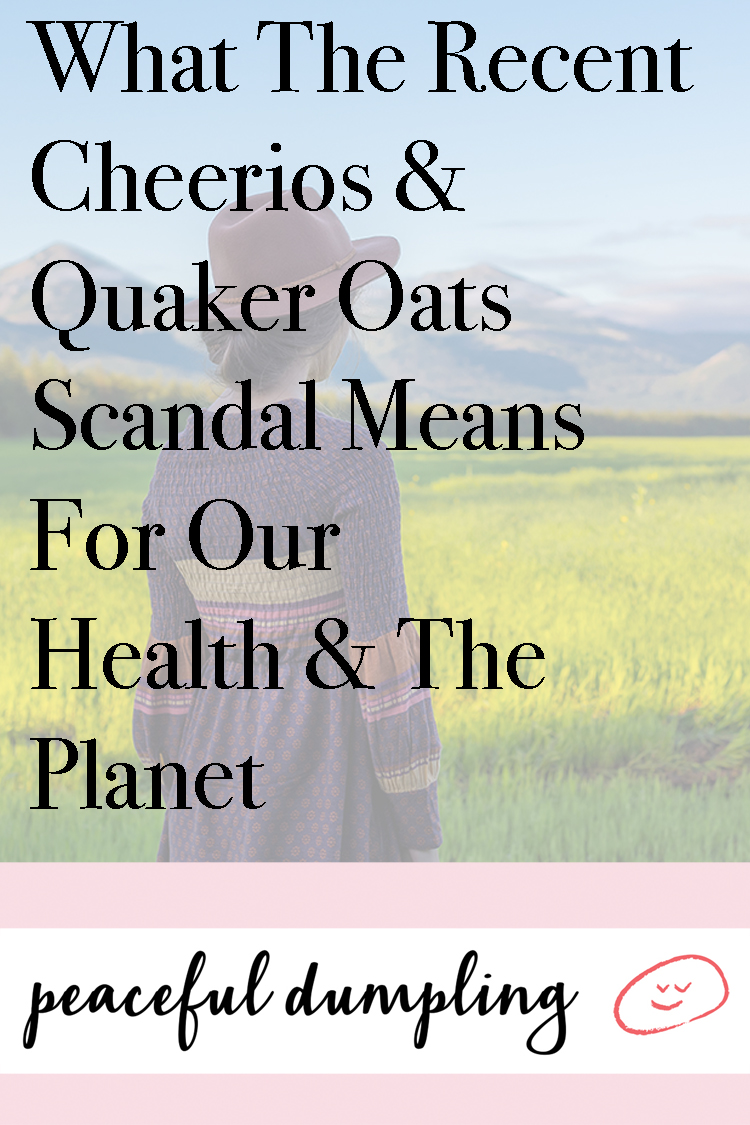We are a generation obsessed with our health and wellbeing. This can have its advantages, of course, because healthier people are generally happier people and happier people live more fulfilling lives. But, the ingredients for good health are far more complex than simply eating salads and going to the gym a few times a week. There’s so much that we aren’t factoring into the equation; such as the plethora of pollutants hidden in plain sight that perturb our bodily functions on a daily basis. One of the most infamous is the herbicide glyphosate.

It’s time we sit down and have a serious chat about glyphosate today, folks, because its effects are truly horrifying. Used in parks and on agricultural land around the world, glyphosate is more commonly referred to by its commercial name Roundup. It is a weedkiller used by the masses as a quick fix to eradicate unwanted plant growth. You might be aware of the name ‘Roundup’ because of the huge lawsuit that finally came to fruition last month when Monsanto (the producer of Roundup) was ordered to pay $289m as they were deemed liable for the cause of a man’s terminal cancer. The company has long argued that Roundup is non-carcinogenic. That has, however, been disproved time and time again. Now it’s finally coming to light for the masses.
Glyphosate can cause a whole host of deleterious effects in humans. One study has shown that its frequent use on soybean plantations serves as an endocrine disruptor by exhibiting estrogenic effects. This, combined with the phytoestrogens found in the soybeans themselves has been shown to induce breast cancer cell growth. As well as causing cancer, glyphosate can cause birth defects, kidney disease and colitis amongst others horrendous things. It’s truly terrifying and absurd that it’s still legal.
There have been strong campaigns seen around the world for a ban on its use and several parts of Europe including Sweden, Holland and Denmark have put restrictions in place, but as for the UK and USA, it is still prevalent. Two in three loaves of bread in the UK have been found to contain pesticide traces; a scary thought when you factor the implications of bioaccumulation into the equation. In the US, glyphosate traces have been found in Cheerios, Quaker Oats and other breakfast foods that could increase the cancer risk in children.
But it’s not just humans that feel the effects of such a poisonous chemical; our invertebrates too are suffering. Bee populations are declining across the globe and that’s bad news for the food industry. One in three mouthfuls of food that we eat was provided for us by bee pollination. Honeybees are delightful creatures who have marked sensitivity to glyphosate. Chronic exposure has been shown to change their foraging behavior. Their ability to learn is impaired and their memory compromised. Long-term, this can cause huge implications for a hive’s overall performance.
It’s a more complex issue in nature than a simple case of direct toxicity though. The monarch butterfly, for example, spends its larval stage feeding on milkweed found in North America. The loss of milkweed as a result of obsessive herbicide use on agricultural land is threatening the survival of this species. If food sources are insufficient, there is, of course, a decline in the number of organisms that feed upon them. This has repercussions further up the food chain.

It’s a bizarre concept: this idea that we think we can decide what grows where. Furthermore, that we should decide what’s an acceptable plant for society and what’s an unsightly weed. Our flagrant disregard for ecosystem function is what results in such atrocities as species demise. The land need not be a jungle, but it has evolved for far longer than we have and certainly knows best how to maintain homeostasis. Perhaps it’s time we take a closer look and learn from nature for a change?
As it stands, Monsanto is facing 4,000 court cases similar to the aforementioned costly case of Dewayne Johnson. Johnson’s non-Hodgkin lymphoma (NHL), a blood cell cancer, has left him in a lot of pain with likely only a few months to live. He testified that he would never have sprayed the product so liberally on school grounds and in community parks as part of his job as a groundskeeper if he’d known what was to come.
Why do we take the risk? Why are we continuing to use something that has hefty evidence working against it? Is it not worth taking the time instead to invest in changing our relationship to plant biodiversity and making our environment and ourselves healthier in the process? We spend enough time and energy working out and trying to buy the best ingredients for our meals; isn’t it equally as important to ensure the environment that we encounter every day is supporting that healthy journey of ours too? Food for thought.

Are you concerned about the effects of glyphosate on your health?
Also by Kat: Why You Should Rethink Your Choice of Toothpaste
Related: PSA: Pact Organic Is A Greenwashing Master. Where To Buy Real Eco-Friendly Undies
How I Became Organic Vegan, Lost 40lbs & Changed My Life
Get more like this—Subscribe to our daily inspirational newsletter for exclusive content!
